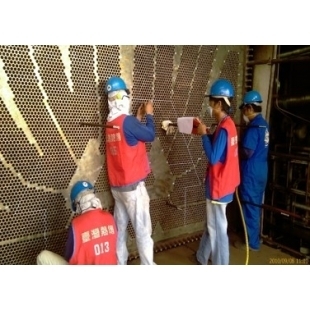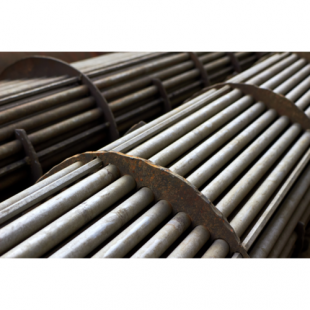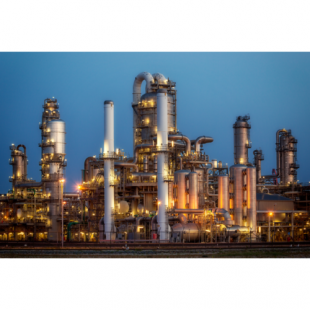All Capability
-

Tube Replacement Engineering
Taiwan Heat Transfer has over 30 years of extensive experience, providing high-quality and rapid modular and on-site tube replacement services to major power plants, steel mills, and chemical plants across Taiwan. We specialize in maintenance and refurbishment projects for various equipment such as heat exchangers, power plant condensers, feedwater heaters, and preheaters, always adhering to high-quality and cost-effective standards. With the richest on-site tube replacement experience in Taiwan and our self-developed specialized equipment, coupled with modular project management, we guarantee that our clients' projects will be completed on time, within budget, and with minimal risk.
In addition to tube replacement projects, we also offer system upgrade services to meet various client needs. For example, when upgrading power plant system condensers, we can simultaneously provide maintenance, refurbishment, or cleaning services for equipment such as extractors, deaerators, and feedwater heaters, providing clients with comprehensive one-stop solutions.Tube Replacement Engineeringmore -

Turnkey Engineering
Taiwan Heat Transfer offers small-scale integrated contracting services aimed at providing customers with comprehensive one-stop solutions, thereby streamlining the engineering contracting process and ensuring the smooth progress of projects. Our engineering scope includes main unit equipment (such as heat exchangers, reactors, pressure vessels, pumps, fans, chillers, etc.), piping and installation, instruments and control components, control logic (such as PLC), and safety protection device planning (such as safety valves), among others. At any stage, we consistently strive to provide high-quality, efficient services to meet customer needs and expectations.Turnkey Engineeringmore -

Pilot Plant
Taiwan Heat Transfer can assist in planning various types of Pilot Plants. A Pilot Plant is a small-scale pre-production system of a trial nature, used when adopting new production technologies. Its primary purpose is to understand new technologies and obtain production parameters. The knowledge gained is then used to design comprehensive production systems and commercial products, as well as to determine further research goals and actual equipment deployment plans.
The term "Pilot Plant" is relative in nature, as Pilot Plants are typically smaller than full-scale production facilities, but their constructed scale varies. Additionally, since Pilot Plants are intended for learning, they are typically more flexible and may sacrifice economy. Pilot Plants require various process equipment, instruments, and piping, control procedures, and manufacturing.Pilot Plantmore -

Waste Heat Recovery
We offer tailor-made waste heat recovery engineering solutions and complete turn-key packages, including equipment, instrumentation, and on-site installation.
Our services cover multiple application areas:
- Efficient recovery of waste heat resources using heat exchangers and absorption chillers.
- Utilization of Media Gas-Gas Heater (MGGH) technology to eliminate white smoke emissions.
- Resolution of various engineering bottlenecks.
- Provision of diverse process preheating solutions to meet customer needs.Waste Heat Recoverymore -

Volatile Organic Compound (VOC) Recovery
• VOC stands for Volatile Organic Compounds. VOC emissions consist of a mixture of hydrocarbons and non-hydrocarbons with varying molecular sizes and chemical structures. Controlling VOC emissions is necessary across various industries, including petrochemical processes, emissions from oil tank vents, gas filling, solvent tanks, and exhaust in painting plants.
• Taiwan Heat Transfer offers several methods for VOC treatment:
1. Condensation: The principle of VOC recovery technology through condensation involves cooling and pressurizing the VOC vapors to condense them back into a liquid state, thus completing the recovery process. While condensation can fully recover VOC liquids, it typically consumes more energy.
2. Adsorption: Adsorption is suitable for low concentration, high-volume organic waste gases, with relatively lower energy consumption. The most common adsorbent is activated carbon, but the drawback is that the equipment size is relatively large, and the process is complex, requiring regeneration or replacement of adsorbents.
3. PSA (Pressure Swing Adsorption): PSA separation and purification technology utilize the adsorption characteristics of gas components on solid materials, primarily using zeolite molecular sieves. Zeolite molecular sieves can adsorb organic components from organic waste gases, and then the remaining gas is sent to the next process, while the molecular sieves can be regenerated for repeated use.
4. Catalytic Oxidation: This method involves heating the gas to temperatures of 300-400°C, causing VOC to undergo oxidation reactions with O2, producing CO2 and H2O. Catalytic oxidation can treat low-concentration VOC, and the reaction process does not produce flames.
5. Photocatalytic Oxidation: This method utilizes the catalytic properties of TiO2 under irradiation from an exciting light source to absorb light quantum by pollutant molecules, thus destroying the pollutant molecules. It is suitable for low-concentration waste gases with strong light quantum absorption.Volatile Organic Compound (VOC) Recoverymore -

Power Plant Related Engineering
Water absorbs heat in the boiler (or nuclear steam generator, waste heat boiler, etc.) to produce steam, which is then sent through pipelines to the turbine to expand and perform work, driving the generator to produce electricity. After performing work, the spent steam is directed to the condenser, where it is cooled by seawater, cooling water, or air, condensing back into water. This water is then sent back to the boiler through feedwater pumps for reheating, generating steam again. Some of the steam is also provided to the steam jet air ejector to maintain system vacuum, or it is used to heat feedwater heaters to form a regenerative cycle to increase overall thermal efficiency. Additionally, some steam is supplied to the deaerator to remove oxygen from the boiler water, thus forming a closed loop. This steam power cycle is known as the Rankine cycle.
We can provide various types of heat exchangers for power plants employing the Rankine cycle, as well as complete plant planning services. Whether it's for new plant construction, expansion, or retrofitting existing units, we can provide assistance.Power Plant Related Engineeringmore






